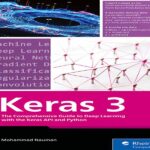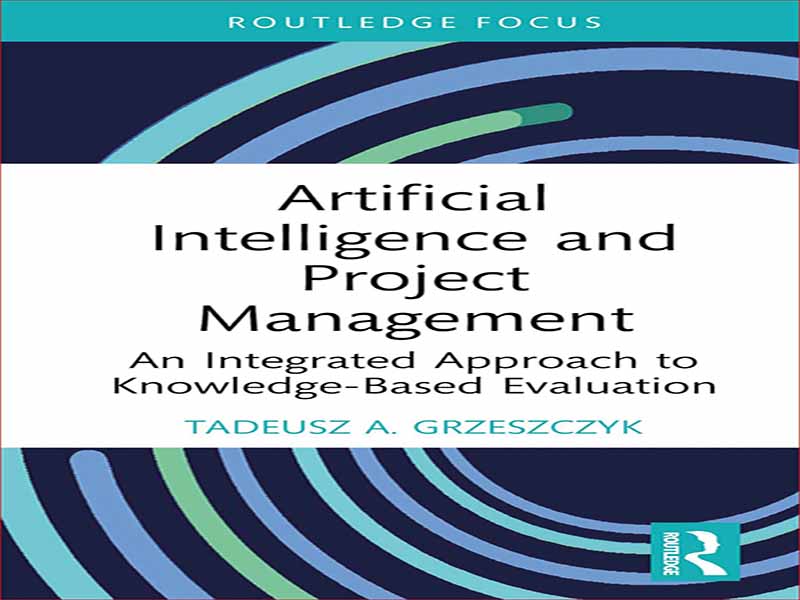- عنوان: Artificial Intelligence and Project Management
- نویسنده: Tadeusz A. Grzeszczyk
- حوزه: مدیریت پروژه
- سال انتشار: 2024
- تعداد صفحه: 89
- زبان اصلی: انگلیسی
- نوع فایل: pdf
- حجم فایل: 2.58 مگابایت
محبوبیت و اهمیت انواع مختلف پروژه ها در مواجهه با پیچیدگی روزافزون عملکرد سازمان های مدرن به طور مداوم در حال افزایش است. آنها اغلب چالش کنار گذاشتن سازماندهی کاری نسبتاً ساده، تکراری و مبتنی بر فرآیند را به نفع تمرکز بر پروژههای منحصربهفرد و پیچیده، که اجرای آن به معنای تصمیمگیری در شرایط عدم قطعیت است، انجام میدهند.
در عمل، تصمیمات نامشخص مربوط به برنامه ریزی و اجرای پروژه ها با استفاده از تحلیل تخصصی چند معیاره اتخاذ می شود. این بدان معنی است که شرکت ها اغلب نیاز به تکیه بر دانش ضمنی و ذهنی کارشناسان دارند. جدای از آن، مسائل مدیریت و ارزیابی پروژه، مشکلات تصمیم گیری ساختار ضعیفی در شرایط عدم اطمینان بالا هستند. این امر ناشی از پیچیدگی روزافزون بسیاری از شرایط بیرونی و درونی عملکرد سازمان و نیز تنوع و آشفتگی قابل توجه محیط پروژه است. نیاز به تجزیه و تحلیل، در شرایط عدم قطعیت قابل توجه، پدیده های پیچیده و پیچیده ای که در یک محیط در حال تغییر پویا رخ می دهند، استفاده از راه حل های مبتنی بر مدل های غیر قطعی و الگوریتم های هوش مصنوعی (AI) را مجبور می کند.
اگرچه برخی از افراد در گذشته در مورد سودمندی چنین راه حل هایی تردید داشتند، هوش مصنوعی نقش رو به رشدی در تجارت مدرن ایفا می کند. توسعه پویا فناوریهای جدید و کاربردهای غنی هوش مصنوعی و سیستمهای مبتنی بر دانش (KBS) در تجارت و مدیریت نشان میدهد که آنها همچنین پتانسیل قابل توجهی برای تغییرات در پشتیبانی از برنامهریزی، ارزیابی و عملکرد طیف گستردهای از سیستمهای موقت و منحصر به فرد ایجاد میکنند. ، و تلاش های پیچیده. می توان انتظار داشت که علاقه به آنها منجر به افزایش حمایت از برنامه ریزی، ارزیابی و اجرای پروژه ها نیز شود. به ویژه، عملکرد صحیح روشهای ارزیابی چند وجهی تأثیر بسزایی در برنامهریزی و اجرای مناسب پروژههای مختلف و همچنین دستیابی مؤثر به اهداف سازمان دارد.
ارزیابی دانش محور ممکن است یکی از جهتگیریها برای توسعه رویکردها و روشهای جامعی باشد که اجرای آن میتواند به بهبود کیفیت، اثربخشی و عینیت فرآیندهای برنامهریزی، ارزیابی و اجرای پروژه کمک کند. ارزش این کتاب از ارائه ترکیبی مشکلات و چالشهای پیچیده مرتبط با توسعه هوش مصنوعی در مدیریت پروژه، پیشنهاد یک رویکرد یکپارچه برای ارزیابی مبتنی بر دانش، و نشاندهنده امکانات بهبود دانش عملی حرفهای در این زمینه ناشی میشود. این کتاب پیشینه کلی چنین موضوعاتی، مفاهیم اساسی انتخاب شده و کاربرد کلی روش های انتخاب شده هوش مصنوعی در مدیریت پروژه را تشریح می کند. محتوای آن تشویق به آشنایی و استفاده از رویکرد یکپارچه پیشنهادی برای ارزیابی مبتنی بر دانش است.
روشهای مختلفی که از مدیریت و ارزیابی پروژه پشتیبانی میکنند، مورد توجه متخصصان و مشاوران تجاری هستند. ابزارها و تکنیک های کلاسیک برای ارزیابی پروژه های سرمایه گذاری بر اساس شاخص های مالی کمی به خوبی توسعه یافته اند. با این حال، علاقه فزاینده ای از سوی پزشکان به یک راه حل علمی برای مشکل ارزیابی چند وجهی پروژه های پایدار معاصر (سازمانی، استراتژیک، اجتماعی، زیست محیطی، و غیره) وجود دارد که اغلب نیازمند در نظر گرفتن کمی سخت است. پدیده ها و معیارهای کیفی این پزشکان محدودیتهای ابزارها و روشهای قدیمی قدیمی را در حمایت از تصمیمگیریها برای پروژههای پیشرفته درک میکنند. تاثیر تحقیقات علمی در این زمینه را می توان به لطف راه حل های پیشنهادی مبتنی بر دستاوردهای گسترده در راه حل های بهبود یافته فناوری اطلاعات و ارتباطات (ICT)، روش های علم داده و یادگیری ماشین (ML) تکمیل کرد.
محتوای ارائه شده در این کتاب به دلیل کاربردی بودن راه حل ها با در نظر گرفتن معیارهای کمی مالی و سایر جنبه های کیفی و دشوار سنجش اقتصادی، اجتماعی، زیست محیطی و توسعه پایدار، در خارج از محیط دانشگاه مفید است. تحقیقات در مورد استفاده از هوش مصنوعی در این زمینه در مراحل اولیه توسعه است. این کتاب به طور مختصر یکی از روندهای تحقیقاتی جالبتر مربوط به ارزیابی مبتنی بر دانش را شرح میدهد.
The popularity and importance of various types of projects are constantly growing in the face of the increasing complexity of the functioning of mod¬ern organizations. They often take up the challenge of giving up relatively simple, repetitive, and process-based work organization in favor of focusing on unique and complex projects, the implementation of which means making decisions in conditions of uncertainty.
In practice, uncertain decisions related to the planning and implementa¬tion of projects are made using multicriteria expert analysis. This means that companies often need to rely on experts’ tacit and subjective knowledge. Apart from that, project management and evaluation issues are poorly struc¬tured decision-making problems in conditions of high uncertainty. It results from the increasing complexity of many external and internal conditions of the organization’s functioning, as well as the significant variability and turbulence of the project environment. The need to analyze, in conditions of considerable uncertainty, complex and complicated phenomena that occur in a dynamically changing environment forces the use of solutions based on nondeterministic models and artificial intelligence (AI) algorithms.
Although some people had considerable doubts about the usefulness of such solutions in the past, AI plays a growing role in modern business. The dynamic development of new technologies and rich applications of AI and knowledge-based systems (KBS) in business and management indicates that they also cre¬ate a significant potential for changes in supporting the planning, evaluation, and performance of a wide range of temporary, unique, and complex endeavors. It can be expected that the interest in them will also lead to an increase in sup¬port for the planning, evaluation, and implementation of projects. In particular, the proper functioning of multifaceted evaluation methods has a crucial impact on the appropriate planning and execution of various projects, as well as the effective achievement of the organization’s goals.
Knowledge-based evaluation may be one of the directions for developing comprehensive approaches and methods, the implementation of which may con¬tribute to the improvement of the quality, effectiveness, and objectivity of project planning, evaluation, and execution processes. The value of this book results from a synthetic presentation of complex problems and challenges related to the devel¬opment of AI in project management, proposing an integrated approach to knowl¬edge-based evaluation, and indicating the possibilities of improving professional practical knowledge in this field. The book outlines the general background of such issues, the chosen basic concepts, and the general usefulness of selected AI methods in project management. Its content is intended to encourage familiarity with and use of the proposed integrated approach to knowledge-based evaluation.
Various methods supporting project management and evaluation are of interest to business practitioners and consultants. Classic tools and techniques for assessing investment projects based on quantitative financial indicators are well developed. However, there is a growing interest on the part of prac¬titioners in a scientific solution to the problem of multifaceted evaluation of contemporary sustainable projects (organizational, strategic, social, environ¬mental, etc.), which often requires considering hard-to-quantify phenomena and qualitative criteria. These practitioners understand the limitations of long-standing classic tools and methods in supporting decisions for advanced projects. The impact of scientific research in this field can be supplemented thanks to the proposed solutions based on the extensive achievements in improved information and communications technology (ICT) solutions, data science methods, and machine learning (ML).
The content presented in this book is useful outside the university environment due to the practical usefulness of solutions considering quantitative financial cri¬teria and other qualitative and difficult-to-measure economic, social, environmen¬tal, and sustainable development aspects. Research on the use of AI in this area is at an early stage of development. This book briefly describes one of the more interesting research trends related to knowledge-based evaluation.
این کتاب را میتوانید بصورت رایگان از لینک زیر دانلود نمایید.



































نظرات کاربران